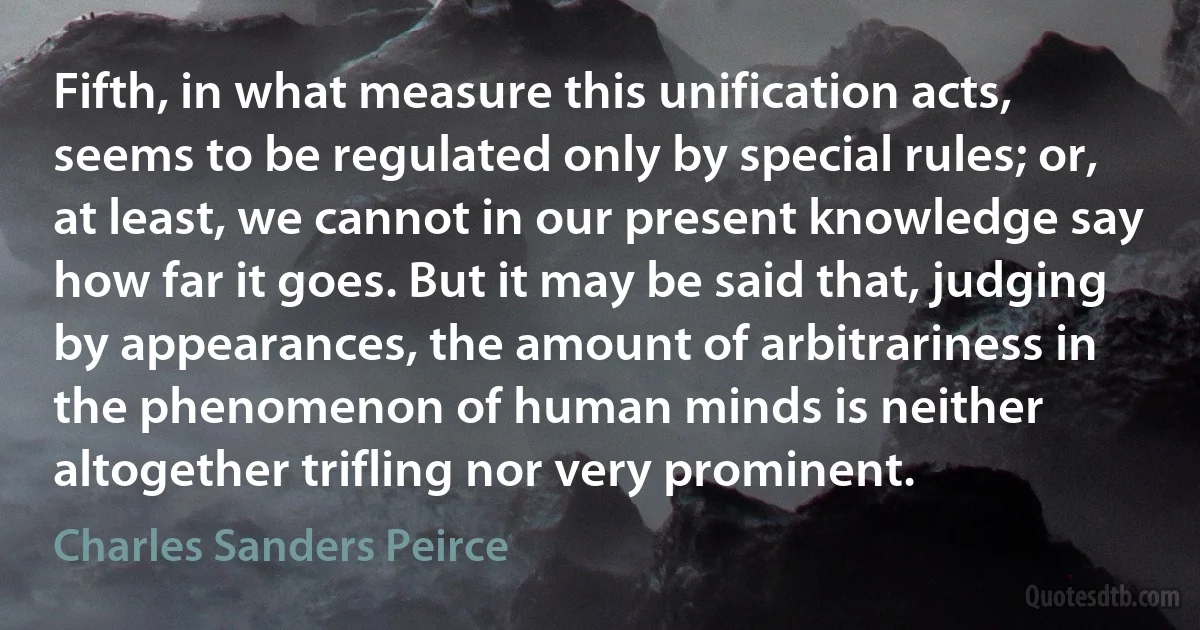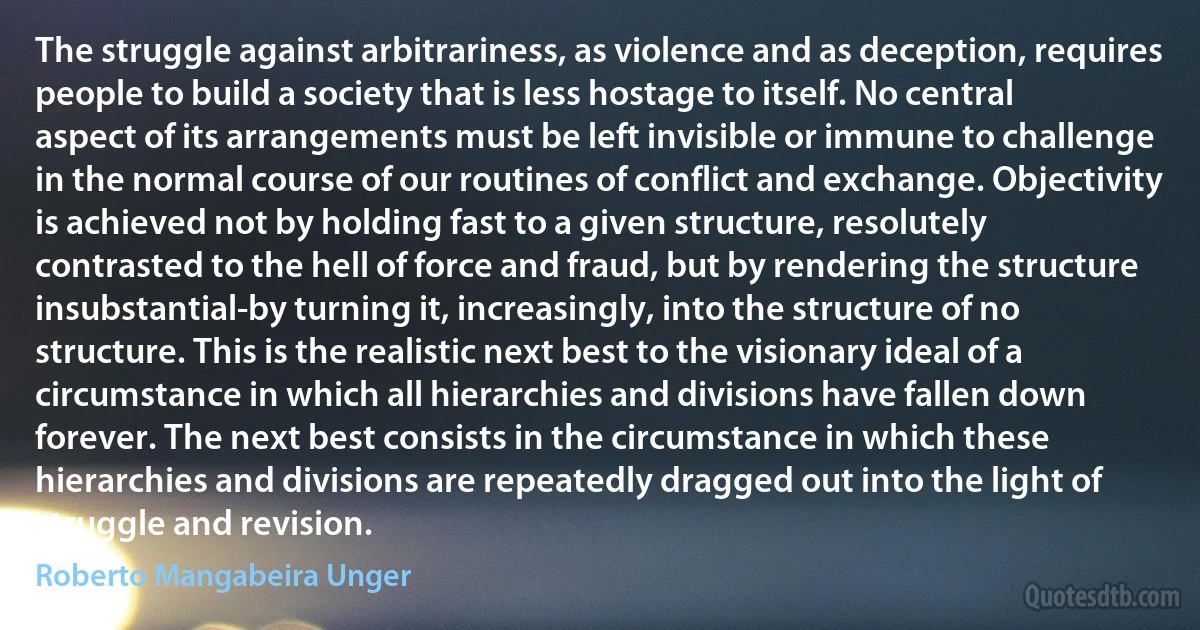Arbitrariness Quotes
It is impossible to repristinate a past world picture by sheer resolve, especially a mythical world picture, now that all of our thinking is irrevocably formed by science. A blind acceptance of New Testament mythology would be simply arbitrariness; to make such acceptance a demand of faith would be to reduce faith to a work.

Rudolf Bultmann
It is a bad thing to perform menial duties even for the sake of freedom; to fight with pinpricks, instead of with clubs. I have become tired of hypocrisy, stupidity, gross arbitrariness, and of our bowing and scraping, dodging, and hair-splitting over words. Consequently, the government has given me back my freedom.

Karl Marx
Fourth, this supreme law, which is celestial and living harmony, does not so much as demand that the special ideas shall surrender their peculiar arbitrariness and caprice entirely; for that would be self-destructive. It only requires that they influence and be influenced by one another.

Charles Sanders Peirce
There is no doubt in my mind that, from the third-person point of view, monarchy is the most reasonable form of government. By embodying the state in a fragile human person, it captures the arbitrariness and the givenness of political allegiance, and so transforms allegiance into affection.

Roger Scruton
This option the consumer retains of being able to buy security wherever he pleases brings about a constant emulation among all the producers, each producer striving to maintain or augment his clientele with the attraction of cheapness or of faster, more complete and better justice.If, on the contrary, the consumer is not free to buy security wherever he pleases, you forthwith see open up a large profession dedicated to arbitrariness and bad management. Justice becomes slow and costly, the police vexatious, individual liberty is no longer respected, the price of security is abusively inflated and inequitably apportioned, according to the power and influence of this or that class of consumers. The protectors engage in bitter struggles to wrest customers from one another. In a word, all the abuses inherent in monopoly or in communism crop up.

Gustave de Molinari
Saussure took the sign as the organizing concept for linguistic structure, using it to express the conventional nature of language in the phrase "l'arbitraire du signe". This has the effect of highlighting what is, in fact, the one point of arbitrariness in the system, namely the phonological shape of words, and hence allows the non-arbitrariness of the rest to emerge with greater clarity. An example of something that is distinctly non-arbitrary is the way different kinds of meaning in language are expressed by different kinds of grammatical structure, as appears when linguistic structure is interpreted in functional terms.

Michael Halliday
That from the outset they expect or even impose all the properties of finite numbers upon the numbers in question, while on the other hand the infinite numbers, if they are to be considered in any form at all, must (in their contrast to the finite numbers) constitute an entirely new kind of number, whose nature is entirely dependent upon the nature of things and is an object of research, but not of our arbitrariness or prejudices.

Georg Cantor
The French symbolists had a special term to express their love for things that had lost their objective significance, namely, ‘spleen.' The conscious, challenging arbitrariness in the choice of objects, its ‘absurdity' and ‘perverseness,' as if by a silent gesture discloses the irrationality of utilitarian logic, which it then slaps in the face in order to demonstrate its inadequacy with regard to human experience. And while making it conscious, by this shock, of the fact that it forgets the subject, the gesture simultaneously expresses the subject's sorrow over his inability to achieve an objective order. Twentieth-century society is not troubled by such inconsistencies. For it, meaning can be achieved in only one way-service for a purpose.

Max Horkheimer
Although textbooks (and professors) like to make definite statements indicating that they know what they are talking about, there is in fact a great deal of uncertainty and ambiguity in the world. ...we will not evade this question but rather explore (overexplore?) it. ...great progress is often made when what was long believed to be true is now seen to be perhaps not the whole truth. Thus the text often uses words... to cause you to think about the uncertainess and even the arbitrariness of much of our current conventions and definitions, to ponder about your acceptance of them.

Richard Hamming
The General Election just concluded has effectively and decisively demonstrated the power of the people, the vitality of the democratic process in India and the deep root that it has taken. The people have given a clear verdict in favour of individual freedom, democracy, and the rule of law and against executive arbitrariness, the emergence of a personality cult and extra-constitutional centres of power. The election marks an important milestone in the evolution of our democratic polity into a healthy two-party system.

Basappa Danappa Jatti
Much of social science has been built as a citadel against metaphysics and politics. Faithful to the outlook produced by the modern revolt against ancient philosophy, the classic social theorists were anxious to free themselves first from the illusions of metaphysics, then from the seeming arbitrariness of political judgments. They wanted to create a body of objective knowledge of society that would not be at the mercy of philosophical speculation or political controversy, and, up to a point, they succeeded. But now we see that to resolve its own dilemmas, social theory must again become, in a sense, both metaphysical and political. It must take a stand on issues of human nature and human knowledge for which no "scientific" elucidation is, or may ever be, available. And it must acknowledge that its own future is inseparable from the fate of society.

Roberto Mangabeira Unger



